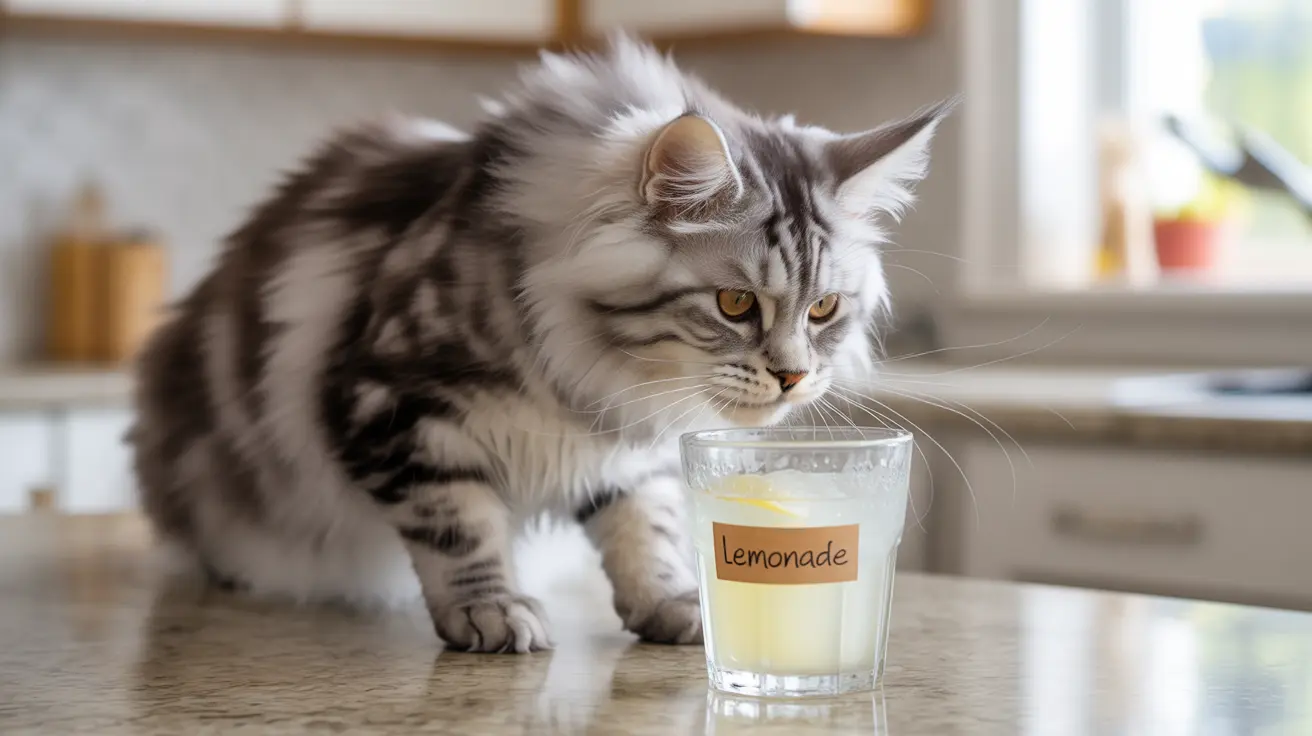As a cat owner, you might wonder if sharing your favorite summer refreshment with your feline friend is safe. The short answer is no - cats should never drink lemonade. This seemingly innocent beverage can pose serious health risks to cats due to its toxic ingredients, high acidity, and sugar content.
Understanding why lemonade is dangerous for cats is crucial for keeping your pet safe and healthy. Let's explore the specific risks and what you should do if your cat accidentally consumes this citrus drink.
The Toxic Truth About Lemonade and Cats
Lemonade contains several compounds that are toxic to cats, primarily from its main ingredient - lemons. The essential oils found in lemons, specifically limonene and linalool, can cause severe adverse reactions in felines. These compounds are particularly concentrated in lemon peel but are present throughout the fruit and its juice.
Additionally, lemons contain substances called psoralens, which can cause photosensitivity in cats. This means your cat's skin could become extremely sensitive to sunlight after exposure to lemon products, leading to severe burns or skin reactions.
Immediate Health Risks of Lemonade Consumption
When a cat drinks lemonade, they may experience several concerning symptoms:
- Severe gastrointestinal upset (vomiting and diarrhea)
- Excessive drooling
- Tremors or seizures
- Lethargy and depression
- Loss of appetite
- Difficulty breathing
- Skin irritation or swelling
The Double Danger: Acidity and Sugar Content
Beyond its toxic components, lemonade presents two additional health concerns for cats. First, its high acidity can cause significant digestive distress and damage to your cat's sensitive stomach lining. Second, the sugar content in lemonade can lead to obesity, diabetes, and dental problems in cats.
Some sugar-free versions of lemonade may contain artificial sweeteners like xylitol, which is extremely dangerous for pets and can cause rapid drops in blood sugar and potential liver failure.
What to Do If Your Cat Drinks Lemonade
If you catch your cat drinking lemonade or suspect they've consumed some, take immediate action:
- Remove access to the lemonade
- Monitor your cat closely for symptoms
- Contact your veterinarian or pet poison control
- Do not induce vomiting unless specifically instructed by a professional
- Keep detailed notes about the amount consumed and when
Safe Hydration Alternatives for Cats
Cats don't need flavored drinks to stay hydrated. The best and safest beverage for cats is fresh, clean water. If you're concerned about your cat's hydration, consider:
- Installing a cat water fountain
- Providing multiple water bowls throughout your home
- Adding small amounts of low-sodium chicken broth (without onion or garlic)
- Using pet-specific water supplements recommended by your vet
Frequently Asked Questions
Can cats safely drink lemonade or lemon juice?
No, cats should never drink lemonade or lemon juice. These beverages contain compounds toxic to cats and can cause serious health problems.
What symptoms indicate lemon or lemonade poisoning in cats?
Signs of lemonade poisoning include vomiting, diarrhea, excessive drooling, tremors, lethargy, depression, and in severe cases, seizures or collapse.
Why is lemonade toxic to cats even in small amounts?
Lemonade contains essential oils (limonene and linalool) and psoralens from lemons that are toxic to cats. Even small amounts can cause adverse reactions due to cats' sensitive metabolisms.
How should I treat my cat if it accidentally drinks lemonade?
Contact your veterinarian immediately if your cat drinks lemonade. Monitor them closely for symptoms and follow your vet's instructions for treatment.
What are safe drink alternatives for keeping my cat hydrated?
Fresh, clean water is the best and safest drink for cats. Pet water fountains can encourage drinking, and vet-approved supplements can be added if needed.
Remember, when it comes to keeping your cat safe and healthy, it's best to stick to water and avoid sharing human beverages, especially those containing citrus fruits or artificial sweeteners.






